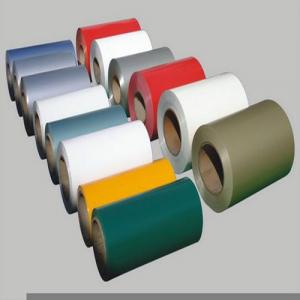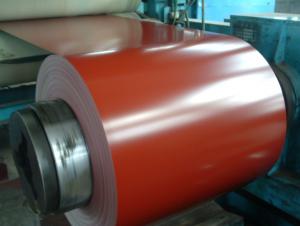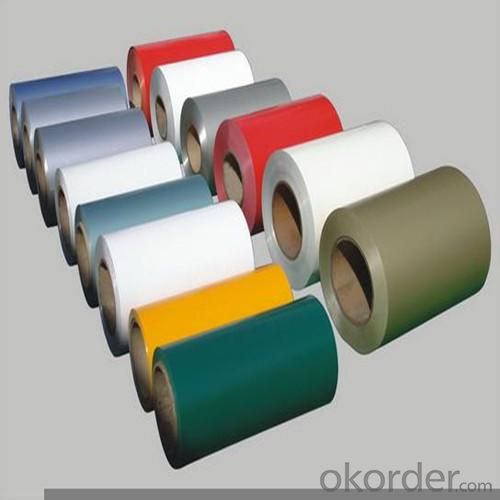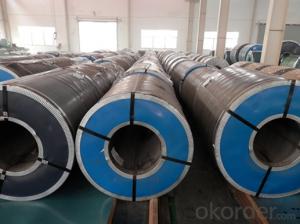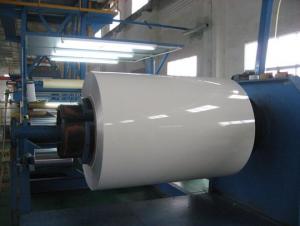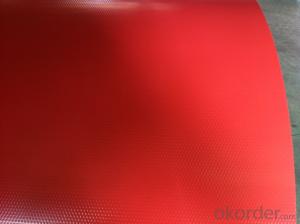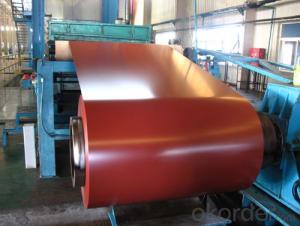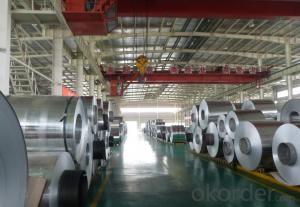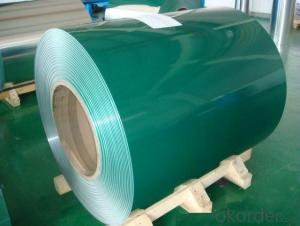York Aluminum Coils - PVDF Coated Aluminum Coil Thickness 0.10-4.0mm
- Loading Port:
- China main port
- Payment Terms:
- TT or L/C
- Min Order Qty:
- 3 m.t.
- Supply Capability:
- 8000 m.t./month
OKorder Service Pledge
OKorder Financial Service
You Might Also Like
1 Specifications of PVDF Coated Aluminum Coil/Sheet
Alloy | AA1050,AA1060, AA1070, AA1100, AA3003, AA3004, AA3005, AA3105, AA5005, AA5052, AA5754, AA5083, AA8011 |
Temper: | H12, H14, H16, H18, H22, H24, H26, H32,HO, F |
Thickness: | 0.10-4.0mm |
Width: | 10mm- 2000mm |
Coating | PVDF |
Painting Thickness | Standard 16-25 microns, max 40 microns |
Color | Acording to Ral colors or customer’s samples |
Standard: | GB/T17748-1999, ASTM, ISO, EU standard |
Special Specification is available on customer’s requirement | |
PVDF(fluorine-carbon) Coating
PVDF(fluorine-carbon) coating :made of fluorine carbon resin, pigment, ester solvent, after high temperature roasting and baking, the paint is solidified to dry film with super weather resistance. PVDF coating also can be classified as traditional PVDF and nanometer PVDF coating.
A.Traditional PVDF Coating, with KYNAR500 PVDF, two or three times for coating and baking, has good properties of anti-acid, anti-alkali and is durable in atrocious weather and environment, keeping 15 years no unwonted fading. In view of these facts, we recommend this panel applied for external wall cladding.
B.Nanometer PVDF Coating, which different with traditional PVDF is the clear coating. It contains nanometer element, which can protect panel from pollution, Because nanometer has self-cleaning effect, It easy to get rid of dust and pollution by raining or water.
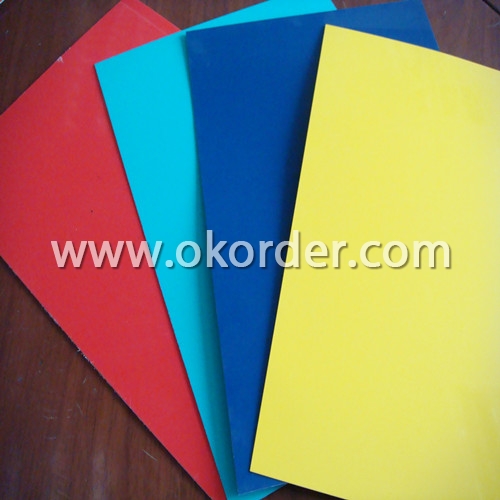
2 Usage/Applications of PVDF Coated Aluminum Coil/Sheet
Our company's PVDF Coated Aluminum Coil/Sheet have been widely used in the fields of construction and decoration(garage doors, ceiling etc.), electronic appliances, lighting decoration, air-condition air pipe, sanwich panels and drainage, etc.
3 Packaging & Delivery of PVDF Coated Aluminum Coil/Sheet
Seaworthy package, plastic bag covered inside, carton wrapped outside, paper core, on the wooden pallet. Pallet weight: 2000-25000KG.
Shipment:the goods will be delivered in 40 days after getting the buyer's payment.
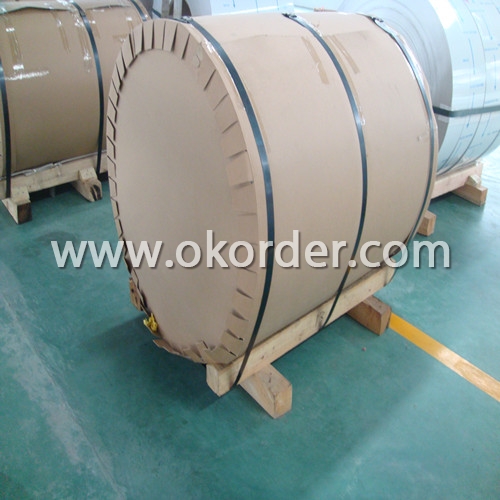
4 Production Flow of PVDF Coated Aluminum Coil/Sheet
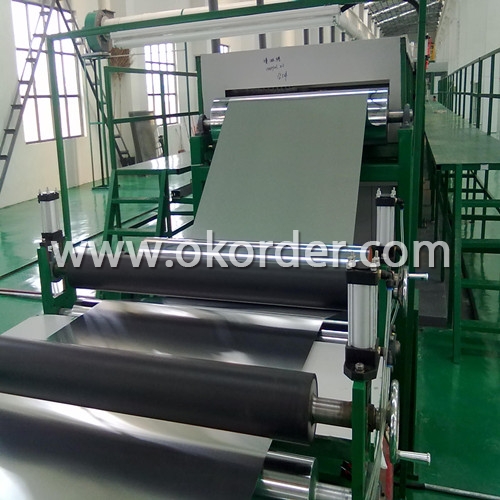
| Aluminum Alloy | AA1100; AA3003; AA5005 |
| Coil thickness | 0.25mm,0.30mm,0.40mm,0.50mm |
| Coil width | 1240mm, 1270mm, 1520mm, 1550mm, 1575mm |
| Coating thickness | Over 25 micro |
| Diameter | 405mm, 505mm |
| Coil weight | 2.5 to 3.0 tons per coil |
| Color | White series, metallic series, Dark series, Gold series( accept color customs) |
Coated Aluminum Coil
The coated aluminum coil is ideal for producing aluminium composite materials. Huawei aluminium coil is coated with high quality fluororesin paint which offers good weather resistance.
- Q: Two days ago, my cocker spaniel ate most of a small aluminum bread pan--the disposable kind you can buy in the supermarket. The pieces I picked up when I discovered what he'd done were sharp, so I called the vet (right before closing), who recommended just keeping an eye on him for nausea, diarrhea, etc. The next morning I brought the dog and he showed no discomfort, but the vet put him on an antibiotic (esp. for gastric problems) just in case. It's been 48 hours, and the dog's still happy and eating and drinking, and when we go for a walk, his poo is fine (yep; I examine it!) ... if he's passed the aluminum, it must have been in the back yard when he was out on his own, and not on a walk. However, I'm still very anxious. At what point can I draw a sigh of relief? Thank you!
- Aluminum will pass just like food. It will empty from the stomach and go through the digestive tract. Hopefully he chewed up the pieces so that they are small and are at no risk of cutting his intestines or bowels. But if he is not yet showing discomfort, all should be well. You made the smart choice and called the vet, and if they do not seem too worried you shouldn't be either unless your pooch begins acting differently or seems to be in discomfort.
- Q: I don't have a rounded baking tray at the moment and would like to replace it with aluminium foil, do you think it's suitable and that it can withheld the intensity?
- Should be fine
- Q: Why 5052 turn black after annealing during the production of aluminum alloy?
- It has been sooted.
- Q: What is the typical thermal conductivity of aluminum coils?
- The typical thermal conductivity of aluminum coils is around 205-230 W/mK.
- Q: Can aluminum coils be used in the production of electronic components?
- Yes, aluminum coils can be used in the production of electronic components. Aluminum is a commonly used material due to its lightweight, conductivity, and corrosion resistance properties. It is often used in electronic devices such as capacitors, inductors, and transformers.
- Q: How are aluminum coils used in the production of furniture?
- Aluminum coils are commonly used in the production of furniture as they can be easily formed and shaped into various components such as frames, legs, and supports. These coils are often bent, cut, and welded to create the desired furniture structure. Aluminum's lightweight yet strong properties make it an ideal material for furniture manufacturing, offering durability and resistance to corrosion. Additionally, aluminum coils can be coated or painted to enhance their aesthetic appeal and match different design preferences.
- Q: What is the common color of aluminum coil membrane?
- The blue transparent membrane is the most common.
- Q: Can aluminum coils be used in heat exchangers?
- Yes, aluminum coils can be used in heat exchangers. Aluminum is commonly used in heat exchanger applications due to its excellent heat transfer properties, lightweight nature, corrosion resistance, and cost-effectiveness.
- Q: Are there any limitations to the maximum coil diameter of aluminum coils?
- Yes, there are limitations to the maximum coil diameter of aluminum coils. The maximum coil diameter is determined by several factors including the type and thickness of the aluminum, the equipment used for coiling, and the intended application of the coil. Generally, larger coil diameters can be achieved with thinner and more ductile aluminum alloys. However, as the coil diameter increases, it becomes more challenging to maintain the structural integrity of the coil and prevent deformation, wrinkling, or damage during handling and transportation. Additionally, the equipment used for coiling may have limitations in terms of the maximum diameter it can handle. Therefore, it is important to consider these factors when determining the maximum coil diameter for aluminum coils.
- Q: Can aluminum coils be used in HVAC systems?
- Yes, aluminum coils can be used in HVAC systems. In fact, aluminum coils are increasingly becoming a popular choice in the HVAC industry due to their numerous benefits. Compared to traditional copper coils, aluminum coils are more corrosion-resistant and can withstand harsh weather conditions, making them ideal for outdoor units. They are also lighter in weight, making installation and transportation easier. Additionally, aluminum coils are more cost-effective and environmentally friendly, as aluminum is a highly recyclable material. Overall, aluminum coils offer improved efficiency, durability, and cost savings, making them a suitable choice for HVAC systems.
1. Manufacturer Overview
| Location | Henan,China |
| Year Established | 2002 |
| Annual Output Value | Above US$200 Million |
| Main Markets | Mid East;Eastern Europe;North America |
| Company Certifications | ISO 9001:2000;ISO 14001:2004;OHSAS 18001 |
2. Manufacturer Certificates
| a) Certification Name | |
| Range | |
| Reference | |
| Validity Period |
3. Manufacturer Capability
| a) Trade Capacity | |
| Nearest Port | Shanghai |
| Export Percentage | 30%-50% |
| No.of Employees in Trade Department | 21-50 People |
| Language Spoken: | English;Chinese |
| b) Factory Information | |
| Factory Size: | Above 100,000 square meters |
| No. of Production Lines | Above 10 |
| Contract Manufacturing | OEM Service Offered;Design Service Offered |
| Product Price Range | Average |
Send your message to us
York Aluminum Coils - PVDF Coated Aluminum Coil Thickness 0.10-4.0mm
- Loading Port:
- China main port
- Payment Terms:
- TT or L/C
- Min Order Qty:
- 3 m.t.
- Supply Capability:
- 8000 m.t./month
OKorder Service Pledge
OKorder Financial Service
Similar products
Hot products
Hot Searches
Related keywords

